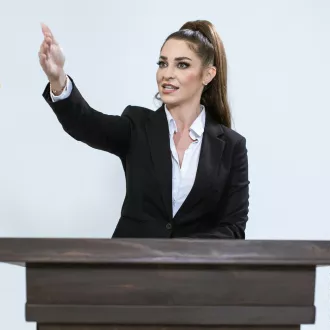Transcription Professional stereotypes and communication
Stereotypes respond to a series of groupings that we make unconsciously. To these we attribute characteristics that we believe are representative of them. These stereotypes often do not correspond to reality and lead to a prejudiced attitude when evaluating a particular subject. In communication there are also stereotypes: one of the most popular is the one that relates the professional profile to his or her communication skills.
When we think of a lawyer, we assume that he or she has very advanced communication skills. On the other hand, when it comes to assessing an engineer, we start with the belief that he or she must not be a good communicator. Considering the importance of this topic, we will be analyzing it in greater depth during this session.
Deconstructing ourselves: Deconstruction is a process that encloses the desire to tear down all attributes and social constructions with respect to a pre-established criterion; it is subsequently analyzed in a coherent manner, taking as evidence the facts and not the ideas. The deconstruction of a communicative profile makes us perceive the person taking into account his or her own aptitudes and talents, stripping us of prejudiced opinions. If you share a professional profile that suffers from the stereotype of not being a good communicator, you will have to undergo a strong deconstruction process.
When we manage to leave behind all those attributes that other people have added to us, most of the time without even knowing us, we are able to measure how far our skills go. An essential task for anyone who wishes to enhance his or her communication skills is to sustain a consistent practice of self-criticism.
Avoid prejudices towards third parties: Earlier we talked about deconstruction as a way to avoid the prejudices that third parties may have towards us. This process of deconstruction has a second vision, which is that of ourselves towards third parties. We are all prejudiced to a greater or lesser extent. Our brain tries to group at all times, so that the information we receive is much easier to process. In this process of grouping at a subconscious level, we constantly make mistakes.
Communication skills develop with daily practice, they are not inevitably associated with a person's professional training. Just as you will find engineers who are excellent communicators, you will come across a lawyer who hates public speaking or who expresses himself incorrectly. Take the time to experience for yourself what other people's skills are like; only then will you be able to formulate a judgment based on facts, not prejudices. It is important that we encourage this practice as an exercise in healthy learning.
Communication develops with practice: Communication develops with practice, this means that regardless of what your communication skills are, continuous practice will make you enhance them and get a better use of them. If you do not start from a good base, either because you have never approached to give talks to other people or because you considered that your professional profile could do without these skills, you are in time to train yourself as an excellent communicator. All you need to do is to start exposing yourself more, get out of your comfort zone and experiment with small talks in close groups.
The more confidence you gain in yourself, the more willing you will be to take more risks on stage and approach more complex speeches and audiences. With the right coaching you can master the same techniques that great speakers apply, always at the pace you are able to learn and hone your skills.
stereotypes communication




